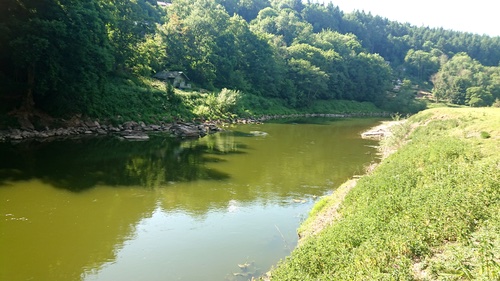Concern grows over the government’s Retained EU Law (Revocation and Reform) Bill, as Angling Trust, Wildlife Trust, RSPB and the National Trust focus on the new Bill’s potential to reverse what limited legal protections our waterbodies, wildlife and natural environments currently enjoy, which was derived from European Law

The phosphate-overloaded river Wye. UK government’s new environment laws could weaken the protection of our rivers afforded by previous EU legislation.
As concern grows over the government’s Retained EU Law (Revocation and Reform) Bill, which is currently going through parliament, the Angling Trust(AT) has put its weight behind a campaign launched by the Wildlife Trust, RSPB and the National Trust. The ‘Attack on Nature’ campaign focuses on the new Bill’s potential to reverse what limited legal protections our waterbodies, wildlife and natural environments currently enjoy, which was derived from European Law.
Re-shaped laws
Since Brexit, the laws are being re-shaped, and the AT is concerned that the protection afforded by these laws could be weakened or removed by the new Bill, which is independent of European influence.
In a special briefing sent to MPs and Ministers, the Angling Trust argues that the Bill as currently drafted could reverse what limited legal protections our waterbodies, wildlife and natural environments currently enjoy.
These European influences include: the Water Framework Directive, which drives up water quality in rivers and waterbodies; Farming Rules for Water, which incentivises good practice to reduce agricultural pollution; and the Urban Waste Water Treatment Regulations, which have driven up standards in the treatment of sewage effluent bringing a number of formerly ‘dead’ rivers back to life.
Alien species
Also included is the Trust’s wish to maintain the Invasive Alien Species (Enforcement and Permitting) Order of 2019, which is the only piece of current legislation that works to prevent the introduction of invasive species. It is designed to identify and prevent introduction and spread of invasive species. The Order is under-pinned by an invasive enforcement regime, including criminal sanctions for people introducing invasive species such as the American signal crayfish, pennywort, and killer shrimps. The Trust says any weakening of the Order would open a breach in the UK’s defences against invasive species.
Currently, there is little sign of a U-turn in the government’s mood, despite opposition to the plans coming from former Prime Minister William Hague, along with pollution campaigner Feargal Sharkey, along with a host of countryside and wildlife groups.
Resistance in House of Lords
However, the Trust anticipates strong resistance to the Bill from the House of Lords.
Angling Trust Chair, Sir Charles Walker MP, said: “The current legally enforceable regulations around water quality and invasive species are essential environmental safeguards. The Angling Trust’s professional team will be working with MPs, Ministers and their officials to try and ensure that these protections are maintained and, where necessary, strengthened.”
Concern over the laws is due to DEFRA having the largest number of regulations and protection that have been brought into UK law from the EU, with DEFRA having to review, amend, or scrap by the deadline of December 31, an estimated 835 different regulations and laws. Those environmental regulations not dealt with would automatically fall.
Angling Trust Policy Chief Martin Salter added: “It’s time the angling community made its voice heard on measures that threaten to undo years of hard work to gain some measure of protection for the environment upon which our sport depends. We have enough trouble as it is with rogue pollution from agriculture and storm sewage overspills without removing the legal framework which enables action to be taken against those who deliberately damage our waterways.”
The Trust will be issuing details of how anglers should contact their MPs on this important issue in the near future.



